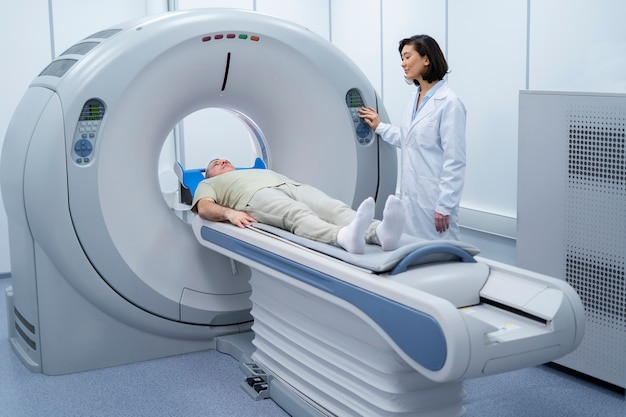PET-CT stands for Positron Emission Tomography-Computed Tomography. It’s a medical imaging technique that combines PET and CT scans into a single examination.
PET uses a radioactive tracer to detect chemical activity in the body, such as glucose metabolism. It’s particularly useful in diagnosing cancers, heart disease, and brain disorders because these conditions often involve increased metabolic activity.
CT (Computed Tomography) uses X-rays to create detailed cross-sectional images of the body. It provides information about the body’s anatomy, such as the size, shape, and location of organs and tissues.
Combining PET and CT scans allows for a more comprehensive assessment of both metabolic activity and anatomical structures. It helps doctors better localize abnormalities and distinguish between benign and malignant lesions. PET-CT is commonly used in oncology for cancer staging, treatment planning, and monitoring response to therapy.
Who performs PET-CT scans?
A PET-CT scan will be performed by a technologist who specializes in these types of scans. After the completion of your scan, a doctor specializing in nuclear medicine or radiology will analyze the test results and interpret the findings. You can have the PET-CT scan performed at a hospital or an imaging test center.
How to prepare for a PET-CT scan?
The following actions are involved in getting ready for a PET-CT scan:
- It is recommended to arrive 15-30 minutes early before your PET-CT scan. The staff will provide you with instructions on how to prepare for the scan. Follow their instructions closely to avoid affecting the scan results. If you have any concerns, don’t hesitate to discuss them with the staff.
- You may be instructed to consume only clear liquids after midnight on the night before the scan. Depending on which part of your body will be scanned, you may need to stop eating and drinking four hours before the scan. However, for specific imaging tests, you are generally allowed to eat and drink as usual.
- Consult your healthcare provider before undergoing a scan to see if it’s safe to continue taking your medications or supplements. If you have diabetes or other medical disorders, notify your healthcare provider, as they can affect the accuracy of the scan results. If you’re breastfeeding or might be pregnant, inform the staff, as these exams can pose risks to the baby.
- It is important to inform the staff of any allergies to drugs or food and any past iodine allergies.
- It is important that you avoid using nicotine products, including cigarettes and patches, for at least 12 hours before your appointment.
- Avoid strenuous exercise 24 hours before a medical scan, as it may affect the accuracy of the results.
- If you are going for a scan, it’s best to wear loose and comfortable clothing without any metal zippers or buttons. Metal-containing clothing like earrings, belts, shirts with snaps or zippers, bras, and glasses can interfere with the scan, so it’s better to avoid them. In case your clothing cannot be worn during the scan, you can wear a hospital gown. You’ll be asked to remove your jewellery on the day of your exam, so it’s best to leave it at home.

